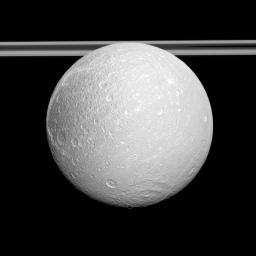
|
East of Wisps
- Click the image above for a larger view
- Full-Res JPEG (512 x 512) (19.7 kB)
- Full-Res TIFF (512 x 512) (262.6 kB)
Caption:
The Cassini spacecraft examines the anti-Saturnian side of Dione and shows the cratered surface east of the moon's distinctive wispy terrain.
The wispy terrain, which consists of bright cliffs on the moon's trailing hemisphere, can just barely be seen on the limb of the moon on the left of the image. North on Dione (698 miles, or 1,123 kilometers across) is up. See PIA12608 for a better view of the wisps. See PIA07769 for more southern view of Dione presented in dramatic false colors.
This view looks toward the northern, sunlit side of the rings from just above the ringplane.
The image was taken in visible light with the Cassini spacecraft narrow-angle camera on Oct. 2, 2011. The view was obtained at a distance of approximately 174,000 miles (280,000 kilometers) from Dione and at a Sun-Dione-spacecraft, or phase, angle of 11 degrees. Image scale is 2 miles (3 kilometers) per pixel.
Background Info:
The Cassini-Huygens mission is a cooperative project of NASA, the European Space Agency and the Italian Space Agency. The Jet Propulsion Laboratory, a division of the California Institute of Technology in Pasadena, manages the mission for NASA's Science Mission Directorate, Washington, D.C. The Cassini orbiter and its two onboard cameras were designed, developed and assembled at JPL. The imaging operations center is based at the Space Science Institute in Boulder, Colo.
For more information about the Cassini-Huygens mission visit http://saturn.jpl.nasa.gov . The Cassini imaging team homepage is at http://ciclops.org .
Cataloging Keywords:
| Name | Value | Additional Values |
|---|---|---|
| Target | Dione | |
| System | Saturn | |
| Target Type | Satellite | |
| Mission | Cassini-Huygens | |
| Instrument Host | Cassini Orbiter | |
| Host Type | Orbiter | |
| Instrument | Imaging Science Subsystem (ISS) | |
| Detector | Narrow Angle Camera | |
| Extra Keywords | Crater, Grayscale, Visual | |
| Acquisition Date | ||
| Release Date | 2011-12-12 | |
| Date in Caption | 2011-10-02 | |
| Image Credit | NASA/JPL-Caltech/Space Science Institute | |
| Source | photojournal.jpl.nasa.gov/catalog/PIA14586 | |
| Identifier | PIA14586 | |
